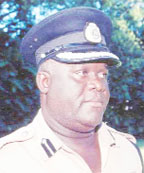– new police prosecutors warned
More than fifty per cent of the witnesses in cases brought against police officers in the magistrates’ courts fail to attend trial or opt not to give evidence, creating difficulties for the prosecution, Police Commissioner Henry Greene said yesterday.

Speaking at the closing ceremony of the Guyana Police Force’s fifth Special Prosecutors’ Course at the Officers’ Mess, Eve Leary, Greene warned the nine graduates that they would have some difficult cases taken before them as persons charged may not only be family members but also some of their ‘squaddies’.
Addressing the issue of witnesses who refuse to testify in cases filed against police officers, he revealed that this was sometimes the scenario even in departmental cases.
While he did not speak directly about the recent torture case involving ranks at the Leonora Police Station, the police chief noted that the force has ongoing training in human rights, therefore the average policeman or woman cannot say “they know nothing about human rights”. He added that those who have to prosecute such matters involving lawmen should take this fact on board.
Speaking about the course itself, Greene said the force always finds it difficult to find the full quota – which should be 15 – because it is a very difficult and rigorous programme that needs some of the brightest minds. As turned out ten persons were enrolled for the training and nine graduated.
Greene explained that the objective of the course is to develop the participants to the level where they can prosecute and effectively present cases in the magistrates’ courts. But he warned the new police prosecutors that the one-year training programme was not sufficient to make them effective and they still needed to do research and seek the assistance of the Director of Public Prosecutions.
He told them that there is nothing more pleasing than preparing one’s case, presenting it in court and winning it. He acknowledged that in many instances the prosecutors have weak cases to work with but said they should still be presented in an effort to see justice served.
“You must be able to assess your case, see the inadequacies and fill in the loopholes,” Greene told the prosecutors adding that their functions are as important as those of the detectives who investigate the cases.
During the year, the first two semesters saw the participants exposed to Evidence, English, Criminal Practice and Procedure, Information Technology, Criminal Law, Legal Reproach and Advocacy. The final semester saw them spending time in the courtrooms. The lone female in the programme, Sergeant Daniels, who Greene described as being a “punisher” at the beginning of the course,” was awarded top student and in addition to the trophy she received she also was given $100,000.
Appeal Court Justice B S Roy delivered the feature address during which he explained that the role of a prosecutor is shrouded in controversy as the different players in the courtroom all have their own ideas as to what it should be. He also pointed out that the court does not find a defendant guilty or innocent, but rather it was guilty or not guilty depending on what evidence is presented in court. The court, he said, can only decide the case on the basis of the evidence presented.



